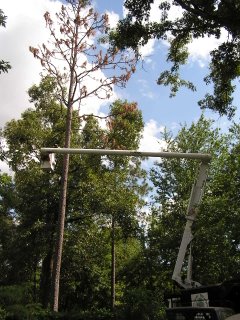As I did my walkabout this afternoon, I kept thinking of the concept of weeds.
My favorite definition of a weed is "a plant out of place." Therefore, an oak seedling can be a weed in a lawn; grass is often weed in a garden bed. The plant species is not really the problem, it's the placement of the plant that is at issue.
A weed is just a plant out of place. That's all. A weed is not the precursor to the downfall of civilization as we know it. It is not Public Enemy #1. If weeds make you feel slightly (or very) panicky, you've been watching (and believing) too many herbicide commercials on TV. Remember (and repeat after me): "The goal of herbicide commercials is to sell herbicide...and fear is a good sales technique. Weeds are not evil creatures of the devil waiting to ruin my home and yard. Weeds are simply plants out of place."
That being said, weeds can take nutrients away from the plants we desire to grow. As such, we often want to remove them from our lawns and gardens. In a garden setting, weeding by hand, mulching the beds, and maintaining appropriate mowing/watering schedules for the lawn are usually all that is necessary for reasonable weed control. Generally "command and control" is a better weeding motto than "total eradication." You're not going to achieve the latter anyway, and you're going to waste a lot of money and poison a lot of earth trying to do so.
All this leads me to a difficult confession, though. Our yard can no longer really be considered organic. As we get ready to move, we are more truthfully operating under "Integrated Pest Management (IPM)" strategies. Specifically, Prairiewolf has been spot-spraying broadleaf weeds in the lawn with an herbicide as he mows.
I am not happy about this.
The lawn is looking the best it has ever looked. You could make the case that the herbicide weed control is the reason for the lawn's health, but I think it's more because of several other concurrent factors:
1) We finally realized the importance of regular watering to the health of the lawn grasses here in the Deep South, and therefore we have been watering religiously whenever the grass begins to get that gray-green color that denotes water stress. Centipede and St. Augustine, our two turf grasses here, don't really go healthily dormant when drought occurs like fescue and many other turfgrasses do.
2) Prairiewolf has been mowing extremely regularly. To my knowledge, he has only missed one weekend all summer. This is much better for the grass than skipping weekends and letting it get too tall. Keeping a consistent height encourages runner formation and keeps the grass from getting too stressed by having too much leaf surface cut off at once.
3) We have been gradually changing out the backyard grass from centipede, which can't handle shade, to St. Augustine, which can. The St. Augustine is doing much better under all our trees.
4) Whenever we get any brown spots or unhealthy looking areas in the grass, Prairiewolf brews up some compost tea and treats the area(s). This has proven to be a wonderful remedy, keeping the lawn much healthier overall.
5) Besides mowing the grass regularly, Prairiewolf has also been cutting the grass quite high. This keeps the soil cooler, prevents a lot of weed seed germination by keeping the soil surface shaded, decreases water evaporation from the soil, and generally reduces stress on the grass.
6) Last but not at all least, we haven't caused or been the victim of any real goofs lately - goofs like killing the "dormant" centipede by applying Round-up to the embedded winter weeds in January or having a contractor kill a large swath of lawn in the middle of the front yard by laying down clear plastic to "protect" the grass as he painted the front door. Come to think of it, it's been a couple years since those things happened. (Knock on wood!)
So there are a lot of reasons why the lawn is looking good this year. It's a lot more than just the broadleaf herbicide. In fact, I contend that it doesn't have anything to do with the herbicide...but I'm sure that Prairiewolf will contest that statement!
Any way you look at it, weeds are a powerful issue in gardening circles.
Can animals be "weeds"? Why not?
How about people? ...It's an interesting concept to meditate about during my next walkabout in the back yard.
 The tree guys finally got here yesterday and cut down the dead pine tree.
The tree guys finally got here yesterday and cut down the dead pine tree.